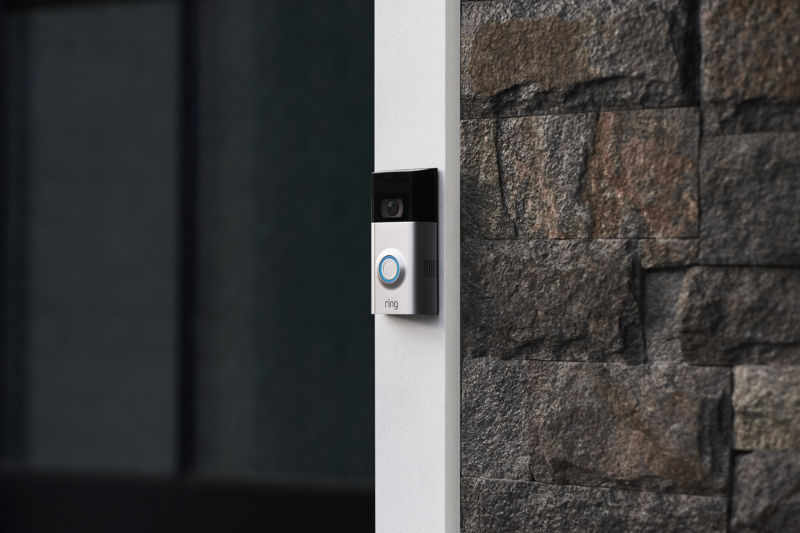
Hundreds of police departments around the country have partnerships with Amazon's home surveillance brand Ring. The relationship benefits both sides: the company provides tech and software to law enforcement, and the cops both provide data to Amazon and also help sell the product to local homeowners. That alone raises troubling issues, but according to a pair of new reports, Ring also gets access to real-time 911 data, and the company helps police work around a need for search warrants when looking for footage.
Gizmodo reported late last week that Ring is tapping directly into real-time 911 dispatch data, which it then uses to "curate" crime news for its Neighbors app.
Ring confirmed to Gizmodo that, in many jurisdictions, it has access to computer-aided dispatch (CAD) data from the emergency response systems their law enforcement partners use. It uses an API call to pull in the address or GPS coordinates of a call, the incident time, and a description of the incident.
Only certain incidents qualify as newsy enough to get pushed to Neighbors as crimes: burglaries, vehicle break-ins or theft, shots fired or shootings, stabbings, hostages taken, and arson. Other forms of assault, theft of things that aren't cars, missing persons, rape, crashes, school evacuations, school lockdowns, threats, and dozens of other categories of crime do not make the cut.
The company also uses CAD data to push public safety alerts to Neighbors related to residential, commercial, and structural fires and explosions.
When Ring receives that data, it then has an "in-house news team" review and reformat the call information before pushing it as an "alert" to app users within a certain radius. As part of that review, the news team scrubs personally identifying data, such as exact address, from the report, the company told Gizmodo.
Watching your “Neighbors”
The Neighbors app is basically your local Nextdoor group on steroids: it generates a map of your local area, then populates it with crime reports and occasionally footage from neighbors' Ring cameras. Theoretically, the information makes a homeowner feel more secure—but given the categories of data Ring pushes to the app and the frequency with which Ring cameras flag false alarms, it may just foster a sense of paranoia for many users.
The police who partner with Ring also have an app. The law enforcement portal tells cops how many Ring cameras there are in a given area, then lets them request access to users' footage from a certain timeframe.
A company representative told Ars after the last time we ran a story about Ring that the company "facilitates" requests by police. "User consent," said the representative, "is required in order for any footage or information to be shared with law enforcement." Ring also said that police are not able to see "any information related to how many Ring users received a request, who declined to share, or which users opted out of future requests."
But there seems to be a big, fat workaround. Vice Motherboard obtained documents showing that Ring advises law enforcement on how to "persuade" users to give up footage.
Engagement is “awesome!”
It's all about engagement, apparently. Motherboard found that Ring coaches police to be proactive on Neighbors to reach out, make connections, post alerts, and otherwise interact. "That will be critical in increasing the opt-in rate," Ring told one police department. "The more users you have, the more useful the information you can collect."
"Seems like you wasted no time sending out your video Request out to Ring users, which is awesome!" another Ring representative told another department.
And for those recalcitrant few, for whom no amount of social buy-in is enough, there's an end-run: police also have the option to ask Amazon directly for Ring footage if a user declines, effectively generating a subpoena.
The Fresno County (California) Sheriff's Office told Government Technology that, while most users "play ball," for the ones who don't, "If we ask within 60 days of the recording and as long as it’s been uploaded to the cloud, then Ring can take it out of the cloud and send it to us legally so that we can use it as part of our investigation."
The officer who spoke to us also dismissed the potential for user privacy concerns. "The consumer knows what they're getting into... If you're a good upstanding person who is doing things lawfully, nobody has concerns," the officer told GovTech.
We've asked Ring for a response and will update when we hear back.
UPDATE 5:55pm ET: After we published our story, a representative from Ring responded to our request for comment to deny all allegations in the Government Technology report.
"The reports that police can obtain any video from a Ring doorbell within 60 days is false," a spokesperson said. "Ring will not release customer information in response to government demands without a valid and binding legal demand properly served on us. Ring objects to overbroad or otherwise inappropriate demands as a matter of course. We are working with the Fresno County Sheriff's Office to ensure this is understood."
reader comments
233